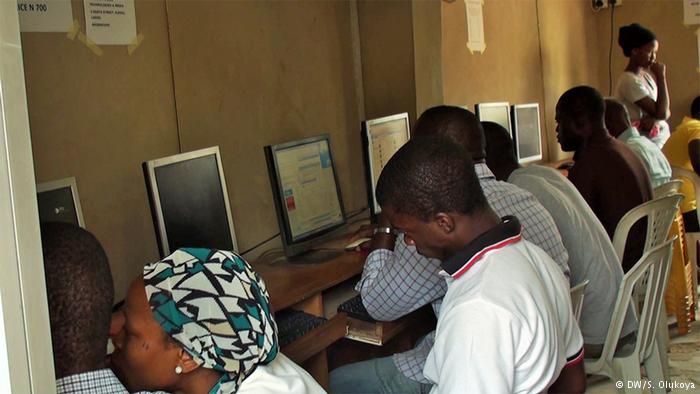Ranked among the best things to have happened in Nigeria, and to Nigerians is the Internet. In 1996, the Nigerian Communications Commission (NCC) licensed 38 Internet service providers (ISPs). This marked the formal launch of the Internet age in Nigeria.
By 1997, the licensed ISPs began operations. And soon, Nigerians could access the Internet at various Internet cafés that sprouted in cities.
In furtherance of Nigeria as a digital society, the Global System for Mobile communication (GSM) was introduced. In 2001, NCC auctioned the Digital Mobile Licence (DML) for a whopping $285 million. The buyers were Econet (now Airtel) and MTN. The DML authorizes the licence holder to operate and deliver mobile services in the country and it must be renewed every fifteen years. This was the harbinger of the mobile Internet era which delivered the death knell of the Internet cafés. According to the monthly Internet subscribers data by the NCC, there were 104.6 million Internet users in Nigeria as of August 2018.


With new technology comes new problems
In the exploration of the world wide web, many naive youths got entangled in Internet scam. It is an advance-fee fraud powered by online communication tools such as email, and more recently, Facebook Messenger and WhatsApp.
The premise on which advance-fee scam operates is: pay a little, make a lot.
According to the FBI, “an advance fee scheme occurs when the victim pays money to someone in anticipation of receiving something of greater value—such as a loan, contract, investment, or gift—and then receives little or nothing in return”. Advance-fee fraud plays on the natural greed of the average man who wants to invest little and win big (even without carrying out due diligence). The promise of a large (too-good-to-be-true) reward has seen countless millions swindled off victims.
In 2006, the United States government carried out a research to trace the location of Internet scammers. The research found that the US housed 61% of internet scammers while the United Kingdom was home to 16%, and Nigeria came next with 6% of Internet scammers being traced to the country.
Locally, Internet scammers are called “Yahoo boys” or “Yahoo-yahoo” (coined from their use of Yahoo mails). However, international authorities are more inclined to refer to them as “419ers”. The name “Nigerian 419 scams” is one that has stuck and emerged because Section 419 of the Nigerian criminal code deals with fraud, the charges and penalties for offenders.
Regarding how the name “Nigerian Prince scam” evolved, it was a result of some scam letters originating from Nigeria stating that a supposed member of a royal family (e.g. a Prince) seeks help to transfer large sums of money out of the country. In return, the “helper” is promised a juicy cut. As part of the deal, the “helper” is asked to provide personal information like their social security number, date of birth and bank account number. Or send a small upfront sum to cover “processing fees”. The victims never get their money or reward back and in cases where they’ve provided their personal details, the “new controller” (scammer) can wipe out the existing funds in the victim’s account.
In 2016, the Counter Threat Unit of SecureWorks carried out a research on internet security which revealed that Yahoo boys are transitioning to wire-wire (often pronounced as “waya-waya,”). This refers to the conventional cybercrime that compromises the account of businesses. Wire-wire is coined from wire transfer, an electronic method of transferring money.
The evolution of Yahoo boys into conventional cybercriminals might be redeeming the country’s image. Because cybercrime, unlike the Nigerian Prince Scam, does not carry the country’s name. But it has far-reaching devastating effects that could further discredit the country. For instance, one successful “wire-wire” could make a company go under.
On the other hand, wire-wire requires a certain level of technical know-how. At least, the Yahoo boy must know how to install malware remotely in order to infiltrate the account system of the victim. Thus, the security agents through intelligence gathering should apprehend these evil genii before they manifest. Once apprehended, they should be rehabilitated and have their crude knowledge refined. In the end, they could become cybersecurity experts.

The Emergence of Nigerian Startups: The Dawn of a New Era
During the same period (the 2000s), Nigeria’s nascent tech ecosystem also started booming. The exploits of some netpreneurs began to obnubilate the Nigerian Prince Scam narrative. These netpreneurs, such as startup founders and developers, caught investors’ interest.
Key to the emergence of Nigerian startups is the innovation and accelerator hubs. Not to discount the efforts of the founders that grind solo. One of such is Jason Njoku of iROKOtv. He and his co-founder, Bastian Gotter, ‘started from the garage.’ And in 2008, they secured about $3 million investment from Tiger Global. In an interview with Dotun on Building the Future, Jason said Tiger Global reached out to them after Techcrunch and other media outlets wrote about iROKOtv.
Prominent hubs in the emergence of the Nigerian tech community are Wennovation and Co-Creation hub (Cc-Hub). Wole Odetayo, Michael Oluwagbemi and Idris Ayodeji started Wennovation accelerator hub in Ikeja, Lagos in 2011. Over the years, now with offices in Abuja and Ibadan, the hub has birthed startups such as Ovotek, e-Pump, Nerve, Yarnable and HutBay.
Co-Creation hub which launched same year in another part of Lagos now called “Yabacon Valley,” is the brainchild of Bosun Tijani and his partners. Though it started as a two-day hackathon and co-working space, it has become the harbor of startups and tech enthusiasts. So much that it was the anchor of Facebook CEO’s – Mark Zuckerberg – visit to Nigeria . Some of the startups from the hub are BudgIT, Truppr, Mamalette, Wecyclers, and Findworka.
Nigerian tech ecosystem has not arrived at its nirvana, but it has come a long way. Some people even argue that Nigeria does not have a tech ecosystem. Whether or not, it would be a disservice not to support the burgeoning tech space in Nigeria.
The Nigerian Startup Funding Report for the second quarter of 2018 shows that $73.6 million funding was received by 27 startups. The funding was provided by 21 foreign investors and six Nigerian investors. Also, Nigeria has witnessed its first international developer conference, signalling a new wave of global relevance in software development.

Moving forward the Nigerian Tech Ecosystem
First, there is a need for more meaningful government intervention in form of public-private partnership. An apposite case is the role of the Lagos State government in making fast Internet connection available for Cc-Hub, and by extension Yaba. The former Governor of Lagos, Babatunde Raji Fashola, gave MainOne Right of Way (RoW) waiver to provide Internet connection from its sea landing point in Lekki to Yaba.
Also, there is an overarching focus on financial services. The Nigerian Startup Funding Report shows that startups providing financial services accounted for 75% of the Q2 2018 funding. True, all hands must be on deck to achieve CBN’s 80% financial inclusion target by 2020. However, it is overriding efforts in other areas such as power, education, health, and tourism. If the same focus on financial services is placed on power, for instance, a sustainable solution to the power failure in the country would be near. The Lumos Mobile Electricity powered by MTN lends credence to this proposition. Although it has its pitfalls, it is still an alternative to the epileptic power supply.
Perhaps, efforts in other areas are not getting the attention they deserve. This segues to the next point. Nigerian media outlets must continue to report the happenings in the tech community. The reportage of tech shouldn’t be the purview of the tech-centric news websites alone. Since most media houses have a technology desk/section, they have a role to play too. The iROKOtv story proves that the media could further position Nigerian startups for funding by spotlighting them.
A tech ecosystem doesn’t rely only on courageous startup founders or investors to thrive. It requires the concerted efforts of the government, universities, research institutions, media and tech enthusiasts. In the fourth industrial revolution, Nigeria must be a player and not an onlooker.
Get passive updates on African tech & startups
View and choose the stories to interact with on our WhatsApp Channel
Explore




